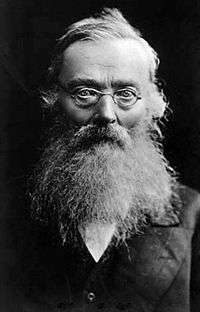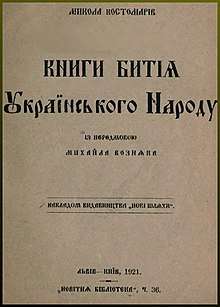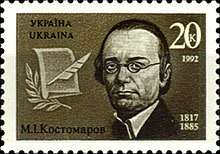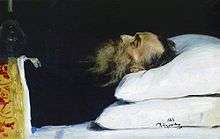Nikolay Kostomarov
Nikolay Ivanovich Kostomarov (Russian: Никола́й Ива́нович Костома́ров, Nikolai Ivanovich Kostomarov; Ukrainian: Микола Іванович Костомаров, Mykola Ivanovych Kostomarov; May 16, 1817, vil. Yurasovka, Voronezh Governorate, Russian Empire – April 19, 1885, Saint Petersburg, Russian Empire) was one of the most distinguished Russian historians, a Professor of History at the St. Vladimir University of Kiev and later at the St. Petersburg University, an Active State Councillor of Russia, an author of many books, including his famous biography of the seventeenth century Hetman of Zaporozhian Cossacks Bohdan Khmelnytsky, and his fundamental 3-volume Russian History in Biographies of its main figures (Russkaya istoriya v zhizneopisaniyakh yeyo glavneyshikh deyateley).
Nikolay Kostomarov | |
|---|---|
 | |
| Born | May 16, 1817 Yurasovka, Voronezh Governorate, Russian Empire |
| Died | April 19, 1885 (aged 67) St Petersburg, Russian Empire |

He was considered by many to be a leading intellectual of the Narodniks.[1] Nikolay Kostomarov was important in the history of both Russian and Ukrainian culture. The question of whether he was more "Russian" or more "Ukrainian" first arose while he was still alive and is still a matter of some dispute.
Historian
His father was a landlord, Ivan Petrovich Kostomarov, and he belonged to Russian Nobility. His distant family roots were in the Grand Duchy of Moscow from the reign of Boris Godunov. His mother Tat'yana Petrovna Melnikova was Ukrainian and one of his father's serfs; that is why Nikolay Kostomarov de jure was a "serf" of his father. (He was, in fact, somewhat critical of his father, but did not marry until late in life, and always remained close to his mother.)
Kostomarov was a specialist of Russian and Ukrainian folklore.[2] He put forward the idea that there are two types of Rus, those of the Kyivan (Ukrainian) background, among the Dnieper Basin, and those who were political subservient to the Russian state.[3] As a historian, Kostomarov's writings reflected the romantic trends of his time. He was the first russian historian who used of ethnography and folksong in history , and tried to discern the "spirit" of the people, including "national spirit", by this method (in russian: narodnost', народност'). On the basis of their folksongs and history, he said that the peoples of what he called Northern or Great Rus' on one hand and Southern or Little Rus' on the other (Russians and Ukrainians, respectively) differed in character and formed two separate nationalities. In his famous essay "Two Russian Nationalities" ("Две русские народности"), a landmark in the history of Ukrainian national thought, he wrote what some consider to be the ideas of Russians inclined towards autocracy, collectivism, and state-building, and Ukrainians inclined towards liberty, poetry, and individualism.In that way he is the precurseur of ukrainian historian Mykhaïlo Hrouchevsky.
In his various historical writings, Kostomarov was always very positive about Kievan Rus', about what he considered to be its veche system of popular assemblies, and the later Zaporozhian Cossack brotherhood, which he thought in part was an heir to this democratic system. By contrast, he was always very critical of the old Muscovite autocracy and its leaders. In fact, he gained some popular notoriety in his day by doubting the story of Ivan Susanin, a legendary martyr hero viewed as a savior of Muscovy. Today he is a very famous historian in Russia and in Ukrainia, where all his historical writings are republished and studied in university .
Religion
Kostomarov was a very religious man and a devout adherent of the Orthodox Church. He was critical of Catholic and Polish influences on Ukraine throughout the centuries, but, nevertheless, was considered as more open to Catholic culture than many of his Russian contemporaries, and later, the members of the Slavic Benevolent Societies.
Cultural politics

Kostomarov was also active in cultural politics in the Russian Empire being a proponent of a Pan-Slavic and federalized political system. He was a major personality in the Ukrainian national awakening, a friend of the Ukrainian poet Taras Shevchenko, a defender of the Ukrainian language in literature and in the schools, and a proponent of a populist form of Pan-Slavism, a popular movement in a certain part of the intelligentsia of his time. In the 1840s he founded an illegal political organization called the Brotherhood of Saints Cyril and Methodius in Kiev (for which he suffered arrest, imprisonment, and exile). This arrest occurred in 1846.[4]
In 1862, he was forced to resign from his post as chair of department of history of the University of Saint Petersburg,[5] because he had sympathized with the revolutionary movement of liberals, progressives, and socialists.[6]
After his arrests, he continued to promote the ideas of federalism and populism in Ukrainian and Russian historical thought. He had a profound influence on later Ukrainian historians such as Volodymyr Antonovych and Mykhailo Hrushevsky.
Writer

Kostomarov was also a romantic author and poet, a member of the Kharkiv Romantic School. He published two poetry collections (Ukrainian Ballads (1839) and The Branch (1840)), both collections containing historical poems mostly about Kievan Rus' and Bohdan Khmelnytsky. His poetry is known for including vocabulary and other elements of traditional Ukrainian folk songs.
He also wrote historical dramas, however these had little influence on the development of Ukrainian theater. He also wrote prose in Russian (the novelette Kudeyar, 1875), and Russian mixed with Ukrainian (Chernigovka, 1881), but these also are considered insignificant.[7]
References
- Mykola Kostomarov, "Two Russian Nationalities" (excerpts), and "A Letter to the Editor of Kolokol," in Towards an Intellectual History of Ukraine: An Anthology of Ukrainian Thought from 1710 to 1995, ed. Ralph Lindheim and George S. N. Luckyj (Toronto: University of Toronto Press, 1996), pp. 122–45. Also available online in Russian.
- Fashioning Modern Ukraine: Selected Writings of Mykola Kostomarov, Volodymyr Antonovych, and Mykhailo Drahomanov, ed. Serhiy Bilenky (Toronto-Edmonton: Canadian Institute of Ukrainian Studies, 2013). Contains a lengthy selection (134 pages) from his various writings including his two autobiographies and his important ideological tract "Two Rus Nationalities."
- Mykola Kostomarov, Knyhy buttia ukrainskoho narodu [Books of the Genesis of the Ukrainian people], ed. K. Kostiv (Toronto: Naukove tovarystvo im. Shevchenka, 1980). Ukrainian text with English, French, and Russian translations, and a lengthy introduction in Ukrainian. Programmatic document of the secret Society of Cyril and Methodius. Only published after Kostomarov's death.
- Nikolay Kostomarov, "Russian History in Biographies of its main figures", in Russian, available online;
- Dmytro Doroshenko, "A Survey of Ukrainian Historiography," Annals of the Ukrainian Academy of Arts and Sciences in the US, V-VI, 4 (1957),132-57.
- Thomas M. Prymak, Mykola Kostomarov: A Biography (Toronto: University of Toronto Press, 1996), ISBN 0-8020-0758-9.
- Thomas M. Prymak, "Kostomarov and Hrushevsky in Ukrainian History and Culture," Ukrainskyi istoryk, vols. 43-44, nos. 1-2 (2006-07), 307-19. Comparison of Ukraine's two most prestigious historians. This article is in English.
Footnotes
- Thomas Prymak (1991). "Mykola Kostomarov and East Slavic Ethnography in the Nineteenth Century". 18 (2). Russian History. pp. 163–186. JSTOR 24657223.
- Sogu Hong (1998). "Mykola Kostomarov and Ukrainian folklore". University of Alberta, Canada.
- Thomas Michael Prymak (1996). Mykola Kostomarov: A Biography. University of Toronto Press. p. 224.
- "Mykola Kostomarov". Canadian Institute of Ukrainian Studies Press.
- Peter Kropotkin (1901). "The Present Crisis in Russia". The North American Review.
- "Kostomarov, Mykola". Internet Encyclopedia of Ukraine.
- Kostomarov, Mykola at the Encyclopedia of Ukraine